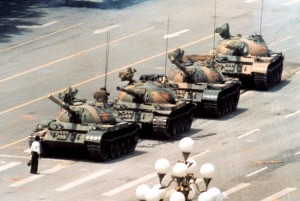
At the movies the other week, I was subjected to an ad featuring a brainless celebration of the 25th anniversary of the invention of the Magnum ice-cream. The Guardian reminded us that this is the 25th anniversary of the first use of the acronym LOL in an online environment. 1989 truly was the beginning of the end times.
The End of History even, if you and Fukuyama remember that lark.
Where were you in 1989? Or, more to the point, how old were you in 1989? Were you old enough? Were you born yet? If you were there, you’ll know that this whole year will be a long string of 25th anniversaries. And you will feel all the feelings, as the kids say. Sad. Old. Nostalgic. Hopeless. Cynical. Hopeful.
Tomorrow isn’t one of the good ones. The wall doesn’t come down. The good guys don’t win. It’s the anniversary of a dead end. I was old enough, and young enough, to be very deeply affected in unspeakable ways. I even wrote a totally indecipherable poem about it around ten years later, that’s how hard it seemed to say anything.
My family and I had been in the square only a year before, wandering its vast expanse in the grey summer rain, through Mao’s Mausoleum, past the Great Hall in whose basement out-of-town troops gathered a year later to launch the attack. China: It was that place where the stories came from, the only ones around at the time to tell you about your crazy people and the terrible things they did to each other, and for each other. Stories of a strange twisted pride of place and explanation. A year later, the greatest story of all started – one that would let everyone find out who we truly were, and what we were capable of.
I watched it all roll out on the TV1 news every night with my family, as autumn rumbled into winter in the suburban antipodes. I remember my parents in that living room, observing their quiet, tense hope.
You know the ending.
Old. Sad. Nostalgic. Fearful of that postmodern memory virus, that renders everything flat, momentary and meaningless. 6-4 becomes a bead that clicks over each year, its texture wearing down with each iteration, a dying prayer. Is that all there is?
I know people who had been a part of the student movement in Beijing and in other parts of the country, who through luck or circumstance avoided or evaded the military attack. One person I know wrote a giant novel about it. More recently, I’ve worked in human rights on the coms side, and have been abreast of the China twitterati, the vast netizen movement and the universe of meme-tastic inside baseball that is the Chinese online experience. But I was never sure how common the knowledge is in China about what happened.
I know a student here from Mainland China – incredibly bright, ridiculously young. Born, in fact, several years after June 4th 1989. I asked this student the other day. The 25th anniversary of liusi is coming up. Did they know about it?
They knew about it.
And did other people know about it?
Outside of universities, people don’t know exactly what happened. But they know something happened. The anniversary makes it all too obvious, when once a year, nothing works on the internet. But students know. Students all know.
And where did they get that knowledge from?
Videos shared between students on their hard drives. Handed down, format to format, over 25 years. It’s a memory kept alive inside universities, by a living oral and multimedia history. This kid had been reading up about the reformists of the time. Like Zhao Ziyang, I asked?
Yes, they said, Zhao Ziyang! Seeming surprised I had heard of him. This process of recovering memory makes it all new. So maybe my fears are unfounded.
Tiananmen, just like Skid Row’s breakout hit of 1989 (another 25th anniversary), I remember you.